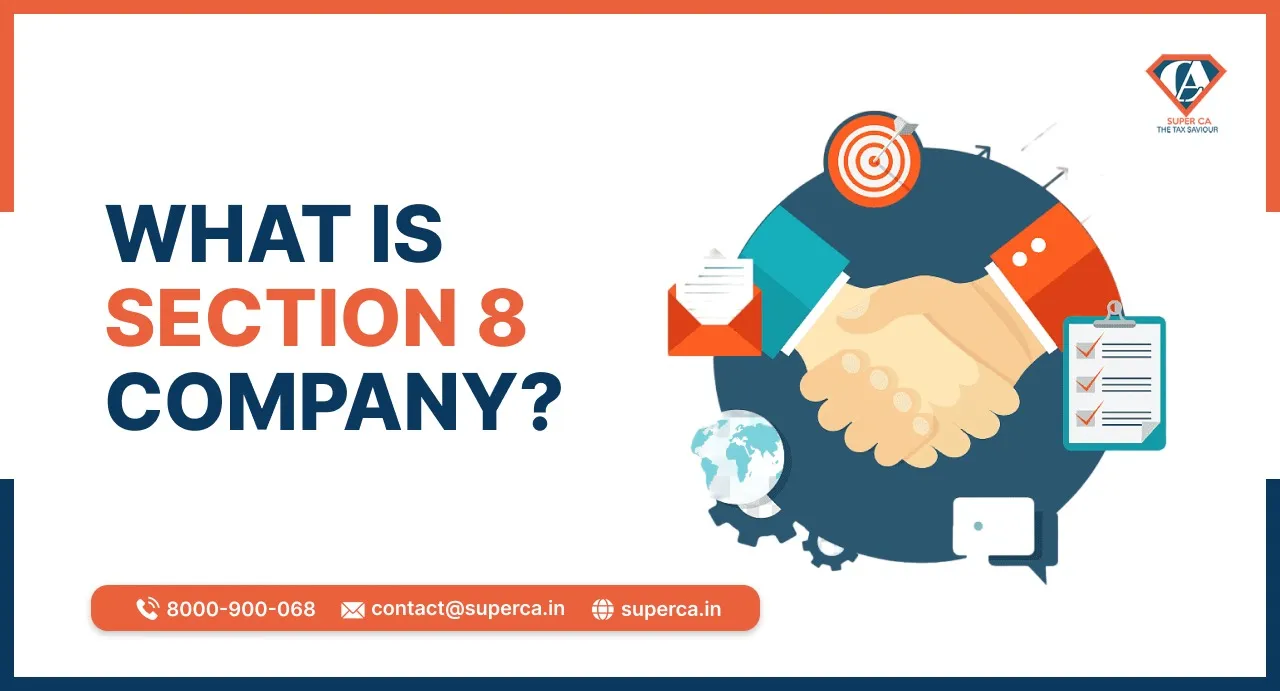What is Section 8 Company? Explained
- Posted By SuperCA
- On 09 July

A non-profit organisation that focuses on promoting art, science, education, sports and charitable activities. Such an organisation is referred to as a Section 8 Company. The profits of Section 8 companies are used in order to promote such goals and shared by the members of the organisation.
As per the guidelines of the Companies Act, 2013 a Section 8 company is described as an entity that has an aim to encourage activities like arts, commerce, science, research, sports, charity, education, social welfare, religion, environmental protection or various other goals having the same purposes. These organisations use the profits that they earn in order to accomplish their mission and not share their profits with their members.
Main Features of Section 8 Company
- Various NGOs(Non-Governmental Organisations) are registered under Section 8 of the Companies Act, 2013 as a Registrar of Societies or as a non-profit-organisation.
- The profit that is earned by the Section 8 Company can only be used for charitable purposes and not any other purposes and it can never be shared among the shareholders.
- Section 8 Company is similar to the former Section 25 of the Company act that was launched in 1956. They are referred to as Section 8 companies according to the existing Company Act.
- A section 8 company has to comply with the guidelines of the Companies Act, 2013. They have to compulsorily maintain account books and follow the guidelines of the GSt and the IT Acts and file returns regularly with the ROC.
- The consent of the government is required in order to make any sort of changes to documents like the AoA and MoA.
Benefits of a Section 8 Company
The benefits of incorporating a Section 8 company have been listed below:
- Tax Exemption
An exemption of 100% is awarded to those Section 8 Companies which are registered under Section 12 AA of the IT Act since they use all their profits for the purpose of charity. Their profit is non-taxable.
- No requirement of Minimum Capital
A Section 8 company does not need a minimum capital to function. They have the ability to adjust the structure of the capital on the basis of their growth which gives them more flexibility.
- No payment for Stamp Duty
A Section 8 company has no need to pay the stamp duty in order to register themselves. In this way, the cost of setting up a Section 8 company is much less.
- A separate legal entity
A section 8 company possesses a separate legal identity and has a permanent existence. In this way their credibility is increased and they enjoy more legal standing and autonomy.
- More Credible
A section 8 company possesses a strict framework with a lot of legal compliance which enhances its credibility.
Eligibility Criteria for a Section 8 company Incorporation
The following is the eligibility criteria for the incorporation of a Section 8 Company in India:
- An individual who is an Indian Resident or a Hindu Undivided Family can incorporate a Section 8 Company
- The company must possess at least one director
- The main aim of a Section 8 Company must be related to encouraging arts and science, sports, education, charitable activities, education and other similar activities.
Requirements For a Section 8 Company
In order to incorporate a Section 8 Company, the following requirements must be fulfilled:
- Number of Directors
A Section 8 Company can operate as a private limited company if it has at least 2 directors and it can work as a public limited company if it has a minimum of 3 directors.
- Number of Members
A Section 8 Company will be restricted at 200 members by the Ministry of Corporate Affairs, if it wishes to function as a Private Limited Company. But, there is no limit to the number of members in the case of a public limited company.
- Capital Required and Name
A Section 8 Company does not need to maintain any sort of minimum capital according to the guidelines of the Companies Act, 2013. Also, the NGOs which operate as a Section 8 Company do not need to use terms such as private limited or public limited in their names.
- Objectives of the Entity
A Section 8 Company will be formed if and only if the main aim of the organisation is not profit- oriented. The MoA and the AoA should state the charitable or social welfare goals for which the company has been incorporated. All the generated profit should only be used for charitable purposes and should not be used for any sort of profit of the entity or its shareholders.
Documents required to incorporate a Section 8 Company
The following documents are required in order to incorporate a Section 8 Company:
- AoA and MoA
- The First Director’s and the Subscriber’s Declaration
- Proofs of address of office like a copy of electricity bill, water bill or a gas bill.
- A copy of Incorporation certificate if there is any corporated body overseas.
- A resolution that has been passed by the company’s promoter
- A Consent of the Nominee
- ID proofs and address proofs of subscribers and nominees
- The address and ID proof of the applicant
- A Digital Signature Certificate
- A Declaration of the unregistered companies
Process to Incorporate a Section 8 Company
The following steps should be followed by the applicant in order to incorporate a Section 8 Company:
- Obtaining the Digital Signature Certificate
Firstly, the to-be directors of the company must acquire the Digital Signature Certificates(DSC). These are required in order to file documents online with the MCA.
- Obtaining the Director Identification Number
Once the directors have obtained the DSC, they will have to apply for the Director Identification Number(DIN). The DIN is an identification number which is unique in nature and is issued by the MCA to those people who want to be directors of an organisation.
- Reserving the name of the company
Now, the name of the company needs to be reserved with the MCA. The name of a Section 8 company must be distinctive. To reserve the name of the company, Form INC-1 is used.
- Filing the incorporation application
Once the name of the company has been approved, now an incorporation application must be filed in order to incorporate a Section 8 Company. This can be done by filing the INC-32 Form in addition to the MoA and AoA of the company.
- Obtaining the licence
When the incorporation application has been approved, the applicant will not have to acquire a licence for the company. This can be done by filing the Form INC-12. This form needs to be filed with all the required documents which are necessary to obtain a licence for a Section 8 Company.
- Obtaining the Incorporation certificate
When the licence has been obtained for a Section 8 company, a Certificate of Incorporation will be issued by the MCA in form INC-16. This certificate is the evidence which proves the incorporation of the company.
Conclusion
In this blog, the Section 8 Companies were discussed. We learnt about a Section 8 Company, the main features of a Section 8 Company, the benefits of incorporating a Section 8 Company, the eligibility criteria to incorporate it and the requirements for establishing a Section 8 Company. We also discussed the documents required for the incorporation of a Section 8 Company and the process for the same.





